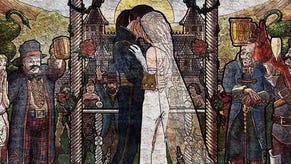Molyneux on emotional games
Says they'll push things forward.
Enthusiastic developer Peter Molyneux has revealed how he thinks the games industry needs to innovate in order to grow - by creating games that make a player feel loved.
The Lionhead boss was addressing an audience of games industry peers in London last week, as part of EA lecture, 'The Industry Speaks: The Future of Entertainment'.
Speaking of the development of upcoming Xbox 360 title Fable 2, and its new features, Molyneux said: "The big feature is the emotions that I want to you to feel. And for me, that is where the revolution comes."
"We have felt the emotion of killing and maiming and the emotions of power. But we need more complex and interesting emotions. That is where real innovation is going to come from."
He said that online play has the potential to bring players together, and open gaming up to a much wider audience, provided it was possible to make players feel loved.
"The innovation that you, me and friends are playing a game together and we're experiencing male-bonding as we all cry over the same thing. That is my ultimate plan. One of the emotions I hope, if I do my job right, is the emotion of being loved. Not of you loving something, but something loving you," he said.
Arguing that true online gaming hasn't been established because current MMOGs aren't reaching a mainstream audience, Molyneux said: "There has not been an online game yet. Yes, there's World of Warcraft, and it's fantastic. I sat in my underpants until four in the morning playing that game for about six months and I realised I was one of the millions of people doing that. But that's not really innovation. That only works for geeks like me. My passion is to introduce everyone to what online games are."
As well as emotional goals, the designer also stated that games need to offer deep experiences that go beyond pleasing an established gaming audience.
"We need more compulsive concepts," he said. "We need less games about zombies and aliens, less games about huge guns, and that will help us reach out to more people. We need unbelievably deep games."
"If we build something and it looks real then it's got to behave real. No longer can we have adventure games where one book in a bookcase is readable."
"Even our physics engines that are around now, when you look at them in games, they're amazing. But they're only amazing to us. That's not good enough for other consumers. They need real physics, not game physics. The games industry has a huge way to go to reach this kind of resolution."









